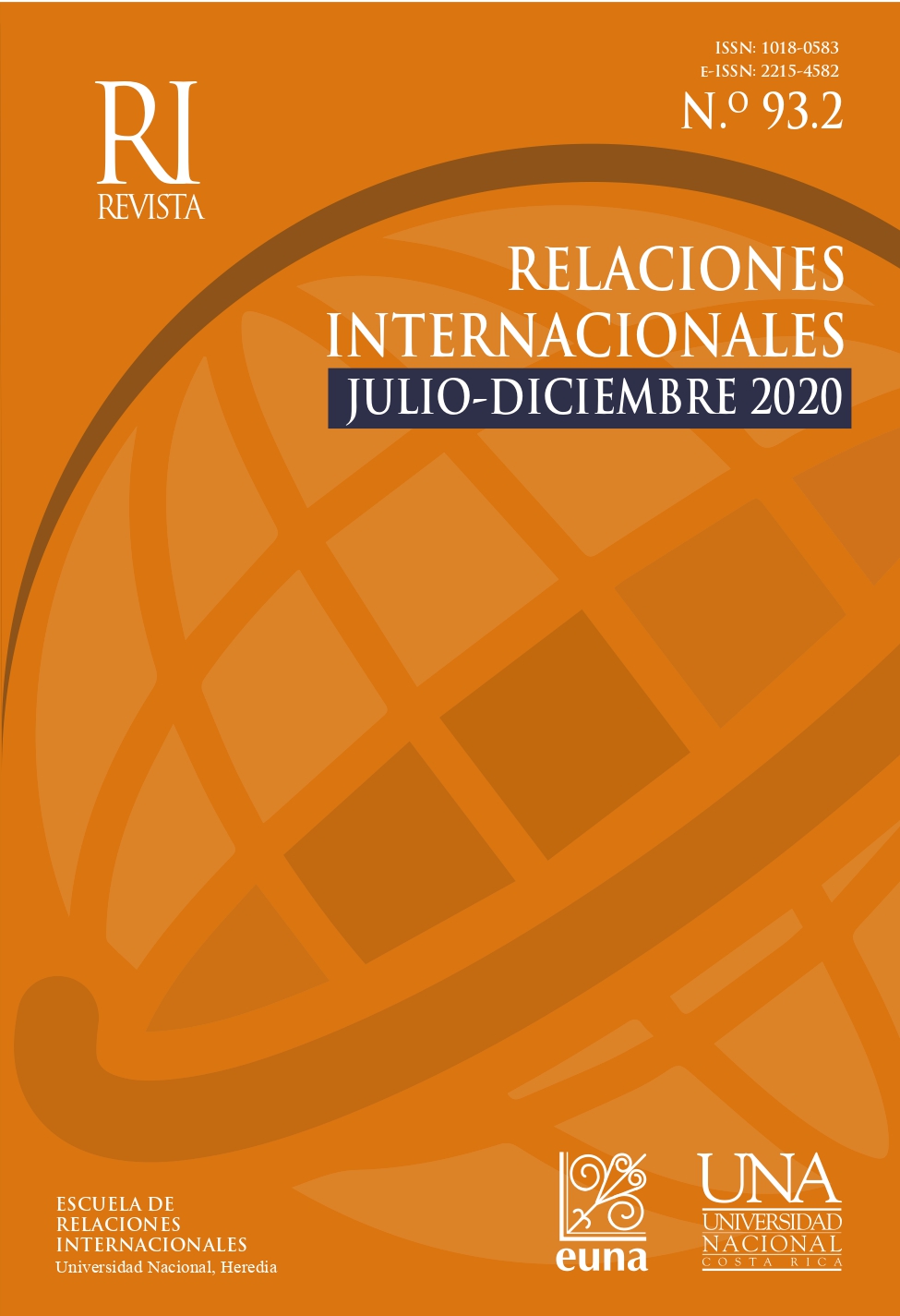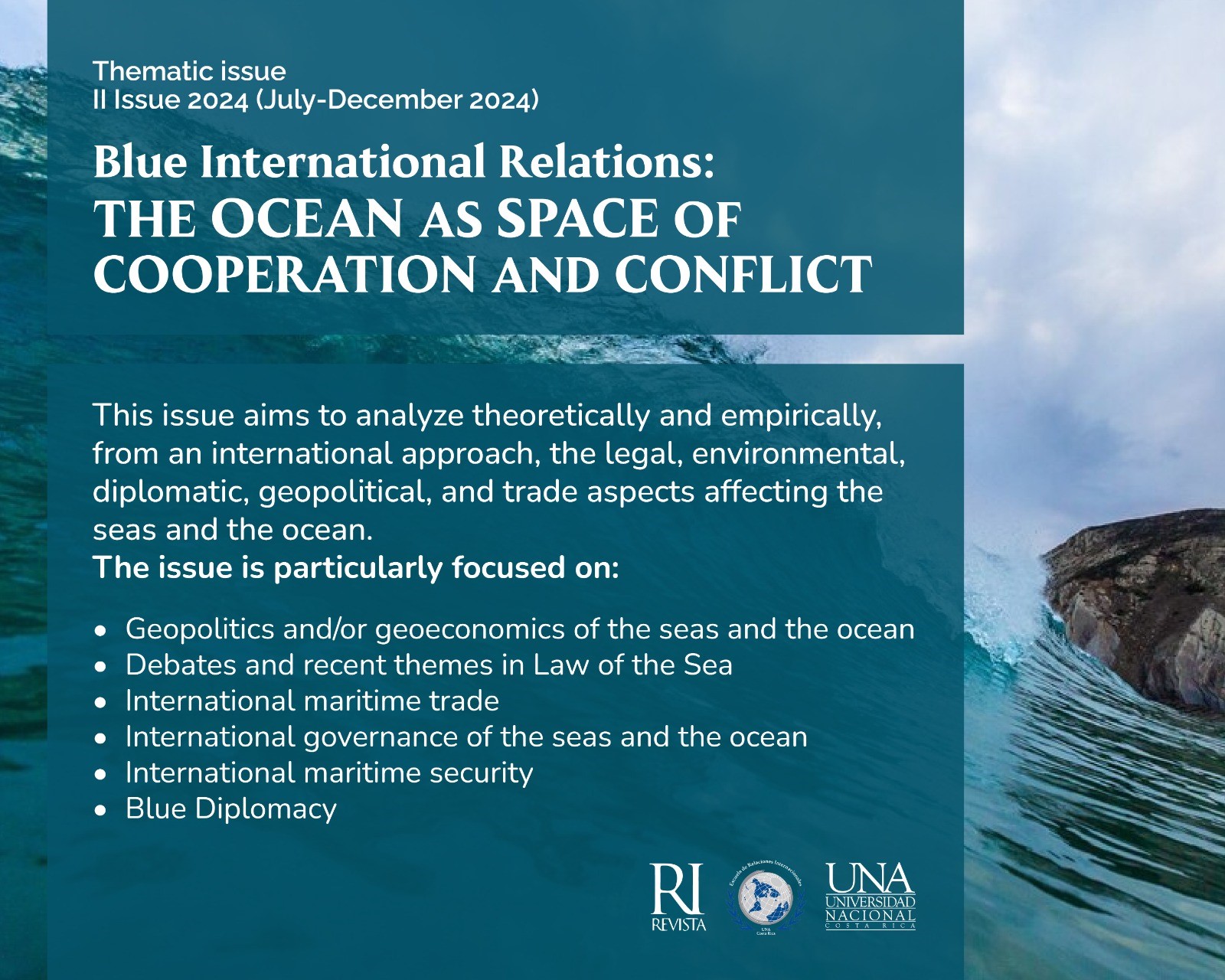China and the (no) Promotion of Autocracy: Contributions to the Debate on Democracy and Authoritarism in the International Order
DOI:
https://doi.org/10.15359/ri.93-2.5Keywords:
China, Autocratic promotion, Democracy, AuthoritarianismAbstract
The reasons why we are in the presence of a third wave of autocratization are not clear yet. However, explanations that prioritize international factors to understand domestic phenomena are increasingly relevant and difficult to avoid. These explanations derive from classic works, which have observed the role of international organizations, to more recent investigations, which consider the role of autocratic regional powers. Due to the characteristics of its regime, China has not escaped the literature on promoting autocracy. However, there is little evidence that China affects or intends to modify the internal political organization of other countries. In this sense, the objective of this article is to debate the role of China as a possible (or not) promoter and diffuser of autocracy. For this purpose, a critical analysis of the literature on this subject and of the investigations that have focused on China was carried out. The analysis of this case detects the complexities of the debate on the promotion of autocracy and the causal mechanisms by which international actors can influence a change of political regime. Based on the Chinese case study, a framework is proposed to better understand how external factors can influence the third wave of autocratization.
References
Allison, R. (2018). Protective Integration and Security Policy Coordination: Comparing the SCO and CSTO. The Chinese Journal of International Politics, 11(3), 297–338.
Ambrosio, T. (2008). Catching the ‘Shanghai Spirit’: How the Shanghai Cooperation Organization Promotes Authoritarian Norms in Central Asia. Europe-Asia Studies, 60(8), 1321–1344.
Ambrosio, T. (2009). Authoritarian Backlash: Russian Resistance to Democratization in the Former Soviet Union. Routledge.
Ambrosio, Thomas. (2010). Constructing a Framework of Authoritarian Diffusion: Concepts, Dynamics, and Future Research. International Studies Perspectives, 11(4), 375–392.
Ambrosio, T. (2012). The Rise of the ‘China Model’ and ‘Beijing Consensus’: Evidence of Authoritarian Diffusion? Contemporary Politics, 18(4), 381–99.
Bader, J. (2014). China’s Foreign Relations and the Survival of Autocracies. Routledge.
Bader, J. (2015). China’s Foreign Relations and the Survival of Autocracies. Routledge. https://books.google.com.uy/books?id=YtdsMAEACAAJ.
Bader, J. (2015a). China, Autocratic Patron? An Empirical Investigation of China as a Factor in Autocratic Survival. International Studies Quarterly, 59(1), 23–33.
Bader, J. (2015b). Propping up Dictators? Economic Cooperation from China and Its Impact on Authoritarian Persistence in Party and Non-Party Regimes. European Journal of Political Research, 54(4).
Bader, J. (2015c). The Political Economy of External Exploitation. A Comparative Investigation of China’s Foreign Relations. Democratization, 22(1), 1–21.
Bader, J., Grävingholt,J. y Kästner, A. (2010). Would Autocracies Promote Autocracy? A Political Economy Perspective on Regime-Type Export in Regional Neighborhoods. Contemporary Politics, 16(1), 81–100.
Börzel, T. A. (2015). The Noble West and the Dirty Rest? Western Democracy Promoters and Illiberal Regional Powers. Democratization: Democracy Promotion and the Challenges of Illiberal Regional Powers, 22(3), 519–35.
Börzel, T. A, and Risse-Kappen, T. (2016). The Oxford Handbook of Comparative Regionalism. Oxford University Press.
Brand, A.; Mcewen-Fial, S. and Wolfgang Muno. W. (2015). An ‘Authoritarian Nexus’? China’s Alleged Special Relationship with Autocratic States in Latin America. Revista Europea de Estudios Latinoamericanos y del Caribe, 99(99), 7–28.
Burnell, P., and Schlumberger, O. (2010). Promoting Democracy - Promoting Autocracy? International Politics and National Political Regimes. Contemporary Politics: promoting democracy - promoting autocracy? International politics and national political regimes, 16(1), 1–15.
Chen, D., and Kinzelbach, K. (2015). Democracy Promotion and China: Blocker or Bystander? Democratization: Democracy Promotion and the Challenges of Illiberal Regional Powers, 22(3), 400–418.
Christensen, T. J. (2006). Fostering Stability or Creating a Monster? The Rise of China and U.S. Policy toward East Asia. International Security, 31(1), 81–126.
Diamond, L. (2008). The Democratic Rollback: The Resurgence of the Predatory State. Foreign Affairs, 87(2), 36–48.
Friedberg, A. L. (2005). The Future of U.S-China Relations - Is Conflict Inevitable ? International Security, 30(2).
Gleditsch, K.S., and D Ward, M. (2006). Diffusion and the International Context of Democratization. International Organization, 60(4), 911–33.
Hackenesch, C. (2015). Not as Bad as It Seems: EU and US Democracy Promotion Faces China in Africa. Democratization: Democracy Promotion and the Challenges of Illiberal Regional Powers - Guest Editors: Nelli Babayan & Thomas Risse, 22(3), 419–37.
Halper, S. (2010). The Beijing Consensus: How China’s Authoritarian Model Will Dominate the Twenty-First Century. Basic Goods. https://books.google.com.uy/books?id=lGpyTbC_rGIC.
Huntington, S. P. (1991). The Third Wave: Democratizacion in the Late Twentieth Century. Norman University of Oklahoma Press.
Kagan, R.. (2007). End of Dreams, Return of History. Policy review, 14.
Kneuer, M., and Demmelhuber, T. (2016). Gravity Centres of Authoritarian Rule: A Conceptual Approach. Democratization, 23(5), 775–96.
Kurlantzick, J. (2007). Charm Offensive: How China’s Soft Power Is Transforming the World Charm Offensive: How China’s Soft Power Is Transforming the World. Yale University Press.
Levitsky, S, and L A Way. (2010). Competitive Authoritarianism: Hybrid Regimes after the Cold War. Cambridge University Press
Levitsky, S. and Way, L. (2015). THE MYTH OF DEMOCRATIC RECESSION. Journal of Democracy, 26(1), 45–58.
Lipset, S.M. (1960). Political Man: The Social Bases of Politics. Bombay Vakils Feffer and Simons Private.
Lührmann, A, and Lindberg, S. (2019). A Third Wave of Autocratization Is Here: What Is New about It? Democratization, 26(7), 1095–1113.
Mearsheimer, J. J. (2010). The Gathering Storm: China’s Challenge to US Power in Asia. The Chinese Journal of International Politics, 3(4), 381–96.
Melnykovska, I; Plamper, H; and Schweickert, R. (2012). Do Russia and China Promote Autocracy in Central Asia? Studies on Common Policy Challenges, 10(1), 75–89.
Nathan, A. (2015). CHINA’S CHALLENGE. Journal of Democracy, 26(1), 157–70.
Obydenkova, A. V., and Libman, A. (2019). Authoritarian Regionalism in the World of International Organizations: Global Perspectives and the Eurasian Enigma. Oxford University Press.
Pevehouse, J. C. (2002). With a Little Help from My Friends? Regional Organizations and the Consolidation of Democracy. American Journal of Political Science, 46(3), 611–26.
Pevehouse, J. C. (2005). Democracy from above: Regional Organizations and Democratization. Cambridge University Press.
Pillsbury, M.. (2015). The Hundred-Year Marathon: China’s Secret Strategy to Replace America as the Global Superpower. Henry Holt.
Przeworski, A; Álvarez, M., Cheibub, J.; and Limongi, F. (May, 2000). Democracy and Development, 635–43. http://ebooks.cambridge.org/ref/id/CBO9780511804946.
Risse, T. and Babayan, N. (2015). Democracy Promotion and the Challenges of Illiberal Regional Powers: Introduction to the Special Issue. Democratization: Democracy Promotion and the Challenges of Illiberal Regional Powers - Guest Editors: Nelli Babayan & Thomas Risse, 22(3), 381–99.
Rueschemeyer, D. (1992). Capitalist Development and Democracy (Eds. Evelyne Huber Stephens and John D Stephens). Chicago University of Chicago Press.
Schmitter, P. (1986). An Introduction to Southern European Transitions from Authoritarian Rule: Italy, Greece, Portugal, Spain and Turkey. In Guillermo O’Donnell, Philippe Schmitter, and Laurence Whitehead (Eds.), Transitions from Authoritarian Rule: Comparative Perspectives1. Johns Hopkins University Press.
Sharshenova, A., and Crawford, G. (2017). Undermining Western Democracy Promotion in Central Asia: China’s Countervailing Influences, Powers and Impact. Central Asian Survey, 36(4), 453–72.
Söderbaum, F. (2004). The Political Economy of Regionalism. The Case of Southern Africa. Springer
Soest, C. (2015). Democracy Prevention: The International Collaboration of Authoritarian Regimes. European Journal of Political Research, 54(4), 623–38.
Tansey, O. (2016). The Problem with Autocracy Promotion. Democratization, 23(1), 141–63.
Tansey, O.; Koehler, K.; and Schmotz, A. (2017). Ties to the Rest: Autocratic Linkages and Regime Survival. Comparative Political Studies, 50(9), 1221–54.
Tolstrup, J. (2009). Studying a Negative External Actor: Russia’s Management of Stability and Instability in the ‘Near Abroad.’ Democratization, 16(5), 922–44.
Tolstrup, J. (2015a). Black Knights and Elections in Authoritarian Regimes: Why and How Russia Supports Authoritarian Incumbents in Post-Soviet States. European Journal of Political Research, 54(4), 673–90.
Tolstrup, J. (2015b). Problems in Studying the International Dimension of Authoritarianism. APSA-CD Newsletter, 8–11.
V-Dem Institute. (2020). Democracy Report 2020. Autocratization Surges – Resistance Grows. https://www.v-dem.net/en/publications/democracy-reports/.
Vanderhill, R. (2013). Promoting Authoritarianism Abroad. Lynne Rienner Publishers.
Way, L. (2016). Weaknesses of Autocracy Promotion. Journal of Democracy, 27(1), 64–75.
Whitehead, L. (1986). International Aspects of Democratization. In Guillermo O’Donnell, Fhilippe Schmitter, and Laurence Whitehead (Eds.), Transitions from Authoritarian Rule: Comparative Perspectives. Johns Hopkins University Press.
Whitehead, L. (1996). The International Dimensions of Democratization: Europe and the Americas. New York Oxford University Press.
Yakouchyk, K. (2016). The Good, the Bad, and the Ambitious: Democracy and Autocracy Promoters Competing in Belarus. European Political Science Review: EPSR, 8(2), 195–224.
Yakouchyk, K. (2019). Beyond Autocracy Promotion: A Review. Political Studies Review, 17(2), 147–60.
Published
How to Cite
Issue
Section
License

Revista de Relaciones Internacionales por Universidad Nacional de Costa Rica está bajo una Licencia Creative Commons Atribución-NoComercial-SinDerivar 4.0 Internacional








1.png)







3.png)
